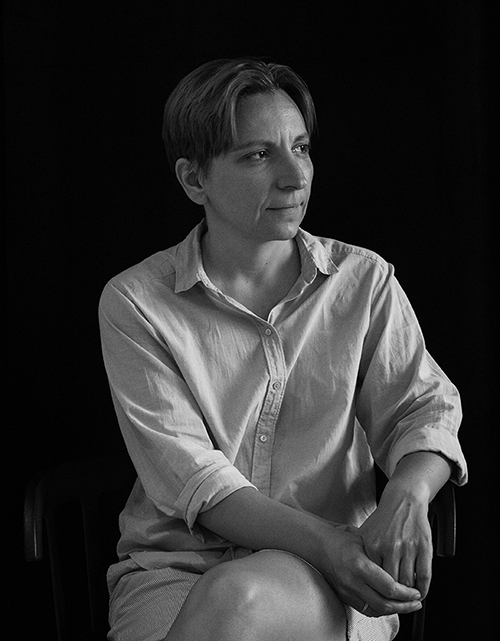This interview was organised by Human Rights House Belgrade for the third edition of the “Portraits of Strength” photo exhibition. The photo was taken by Dragana Nikolić at Miljenko Dereta Space, Belgrade, Serbia, in August 2024.
When did you realise you were a human rights defender?
“I became a human rights defender the moment when I, as a person with a different sexual orientation from heterosexual and gender expression, realised that Serbia is not exactly the ideal place to live. Inequality and injustice in society were the motivation.”
“My activism started through literature. I am, in fact, a writer. I quickly transitioned to law and human rights advocacy, where for nearly 15 years I have been advocating for the defence of fundamental freedoms. When we talk about the values and methods of activism, feminism has played a crucial role in my activist ‘maturation’.”
What is the nature of your work and what challenges do you face as a Woman Human Rights Defender?
“My current task is to be a support and resource for local initiatives in Serbia that are working to advance human rights and the rule of law. ‘Civic Initiatives’ is one of the oldest organisations in Serbia, and through several program areas, we have established a resource centre available to the local civil society. In addition, we are dedicated to ongoing monitoring of institutions responsible for working with civil society.“
“Since there are numerous prejudices against human rights defenders and generally against non-governmental organisations in Serbia, we are often exposed to smear campaigns and attacks by pro-government media due to our work. Often, the targets of these attacks are women.”
Women in Serbia are not forgiven for their activism.
“Due to my activism in the LGBTI+ community and as a member of the Pride Organising Committee in 2015, I was even subjected to physical violence by ultra-right hooligan groups. That case never received a judicial resolution. Similarly, other cases of attacks on human rights defenders typically do not result in charges.”
What is the current human rights situation in your country?
“There is a significant discrepancy [in Serbia now] between adopted laws, strategies, and action plans that are supposed to guarantee [democratic values and rule of law], and what happens in practice.”
“[In 2023, Freedom House reported] that Serbia recorded the largest decline in Europe in terms of political rights and civil liberties. Freedoms in Serbia have been steadily declining over the past 10 years.“
“[Recently], there has been a rise in the number of attacks, both physical and verbal, as well as pressures faced by citizens, activists, and journalists.”
Decades of impunity for hate speech in the public sphere coming from the highest representatives of power send a message that violence is a legitimate means of combating all those who do not conform.
“The unfavourable political climate, in which the erosion of democratic values and institutions have become a regular occurrence, has contributed to the creation of a hostile environment towards anyone who dares to think freely and critically, and to act accordingly in the public sphere.”
“The constant targeting of CSOs as ‘anti-Serbian’, ‘traitorous’, ‘hostile’ and the like has greatly influenced the creation of such an environment.”
What kind of human rights situation in your country would you like to see in the next 30 years?
“In the ideal sense, I imagine Serbia over the next 30 years as a free country where its citizens enjoy all human rights. I imagine it as a place where freedom of assembly, expression and association are not in question. Also, as a place where diversity is respected and where the media is not under the control of the ruling elites.“
“I imagine Serbia in 30 years as free, cleaner in the ecological sense, and where citizens have dignified salaries that make a living. However, the current reality is completely different.”

About Portraits of Strength
Women human rights defenders (WHRDs) work to protect and advance freedoms while facing discrimination and stereotypes about their role and participation in society.
HRHF seeks to honour and promote independent women human rights defenders and their work through the “Portraits of Strength: Women Defending Human Rights” photo exhibition and highlight the human rights situation in the countries of the Network of Human Rights Houses.
The exhibition, now in its third edition, shares portraits and stories from WHRDs working on a variety of issues including the documentation of human rights violations and alleged war crimes, rule of law, women’s rights, political prisoners, freedom of expression, and more.
Find out more here.





